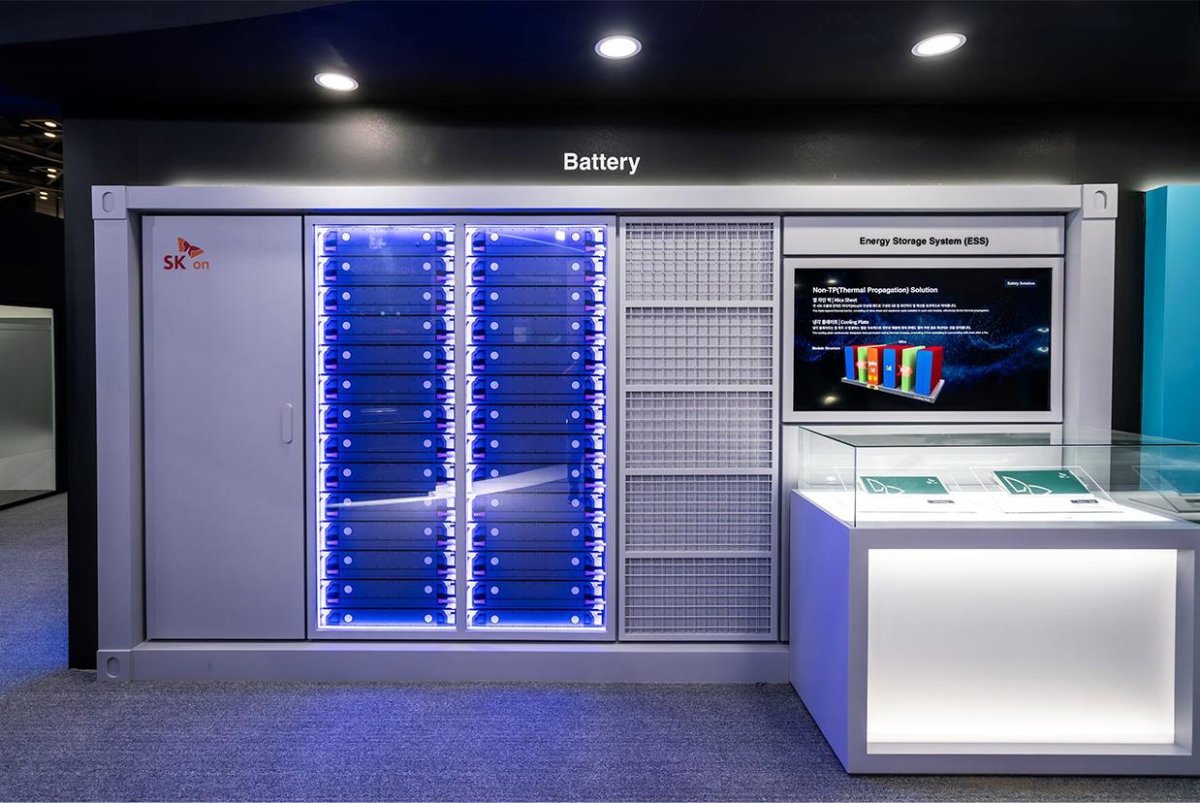SK On’s energy storage system product is on display at the World Climate Industry Expo in
South Korea in August. Photo courtesy of SK On
SEOUL, Sept. 9 (UPI) — South Korean companies are trying to weather the prolonged slump in the global battery industry by partnering with leading corporations in Europe and the United States.
SK On announced last week that it had secured an order from Flatiron Energy Development of the United States to deliver lithium iron phosphate, or LFP, batteries for use in energy storage systems, know as ESS.
Under the agreement, SK On will supply up to 7.2 gigawatt-hours of ESS batteries between 2026 and 2030 for Flatiron’s projects in New England and other states. While the firm did not disclose the contract’s value, local media estimated it at around $1.4 billion.
“This deal is significant as it expands both our product and business portfolio,” SK On Executive Vice President Choi Dae-jin said in a statement. “We will continue to strengthen our presence in the battery ESS sector by leveraging our advanced technologies and production capabilities.”
Earlier this month, SK On’s domestic rival, LG Energy Solution, said that it had signed two contracts worth $10.8 billion with Mercedes-Benz, covering the delivery of 107-GWh battery capacity for the German automakers between 2028 and 2037.
In late July, there were reports that LG Energy Solution has inked a $4.3 billion ESS deal with Tesla.
Such large-sized agreements follow several challenging years for South Korean battery manufacturers, which invested heavily in production facilities only to see demand growth falter.
For example, LG Energy Solution has poured billions of dollars into battery factories in Michigan and Arizona. Yet, global demand for rechargeable batteries has been weaker than expected, as the electric vehicle sales have failed to meet early projections.
According to the International Energy Agency, electric car sales amounted to 17.3 million in 2024, up by more than 25% from 2023, and are projected to top 20 million this year. However, most of this growth has come from China, which relies largely on domestically manufactured batteries.
By contrast, demand has stagnated in Europe and the United States — key markets for Korean battery companies.
“For LG Energy Solution and SK On, the recent contracts are a blessing in a time of need. But, they will still have to endure hard times a few more years,” Daelim University automotive professor Kim Pil-soo told UPI.
“In particular, the United States plans to discontinue its EV subsidies this month, which will further weigh on related industries, including batteries. Without subsidies, EVs still remain quite expensive compared to internal combustion engine-powered models, and the situation is similar in Europe,” Kim added.
Predicting that EVs will be able to gain price competitiveness in three or four years, he recommended that battery makers focus on the emerging ESS markets, which are being boosted by mounting investments in artificial intelligence infrastructure.
The U.S. federal tax credit of up to $7,500 for new EV purchases will officially expire Sept. 30, following the passage of a tax bill in July. And several European countries have also begun phasing out direct purchase incentives.
NH Investment & Securities analyst Neul Ha agreed.
“People avoid buying EVs for two reasons of high price tags and a lack of charging stations. These issues are expected to be addressed in 2027 and 2028, when EVs will become more attractive,” Ha said in a phone interview.
“Battery makers will have to hold on until then. The good news is that the ESS market is bullish, and they can count on that for the time being,” he said.
Meanwhile, the Korea Institute for Industrial Economics and Trade recently published a report in which the state-backed think tank picked military drones and humanoids as potential new markets of battery firms.
“The biggest technical hurdles of military drones are short flight duration and noise issues. To grapple with these, high-performance batteries are necessary,” the institute’s director, Hwang Kyung-in, told UPI.
“As AI technology improves the learning and reasoning capabilities of humanoids, power consumption is set to rise. Hence, developing batteries dedicated to robots is a critical task for the commercialization of humanoids,” he said.
Hwang also noted that the United States is highly likely to resort to Korean battery companies rather than their Chinese competitors. The global battery market is dominated by Korean and Chinese players.
